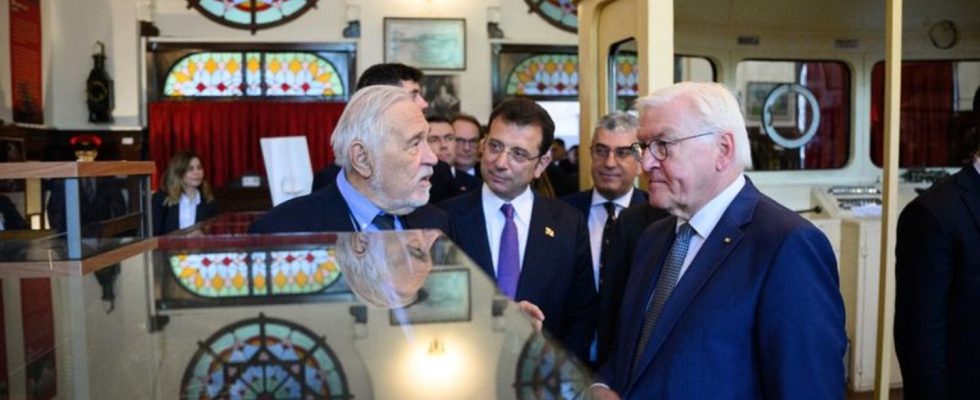Federal President in Turkey
Steinmeier praises the Turks’ development work in Germany
Federal President Frank-Walter Steinmeier (r.) and Ekrem Imamoglu (M.) are guided through the museum in Istanbul Sirkeci train station by historian Ilber Ortayli (l.). photo
© Bernd von Jutrczenka/dpa
A kebab shop owner almost steals the show; demonstrators compare him to Hitler. Federal President Steinmeier’s three-day trip to Türkiye gets off to a somewhat stormy start.
In Essen they brought the coal from the depths underground and put it in Cars were assembled on an assembly line in Cologne – hundreds of thousands of Turks contributed to the German economic miracle from the beginning of the 1960s.
Federal President Frank-Walter Steinmeier acknowledged this achievement, which is often forgotten by Germans, in Istanbul at the start of his three-day trip to Turkey: “You helped build our country, you made it strong and you belong at the heart of our society,” he said with a view to the almost three million people of Turkish origin who live in Germany today. “They are not people with a migrant background – Germany is a country with a migrant background.”
Pro-Palestinian groups disrupt the tour
Steinmeier began his visit at the historic Sirkeci train station, from which many Turks set off for Germany. His tour of the train station was loudly disrupted by a group of pro-Palestinian demonstrators. The approximately 50 men and women chanted slogans from a distance of almost 100 meters and showed signs with portraits of Steinmeier, Hitler and Israeli Prime Minister Benjamin Netanyahu. The faces of Steinmeier and Netanyahu were disfigured with Hitler beards. Despite the protest, Steinmeier was able to visit the station without any problems.
The Federal President was greeted by the newly re-elected Mayor of Istanbul, Ekrem Imamoglu. President Recep Tayyip Erdogan’s opponent is considered a future presidential candidate. Imamoglu previously described German-Turkish relations as something very special. Erdogan will only meet Steinmeier at the end of his trip in the capital Ankara.
With this sequence, Steinmeier is sending the signal – regardless of whether it is targeted or not – that Berlin is already looking at the possible post-Erdogan period. It is fitting that a conversation with the leader of the opposition CHP party, Özgür Özel, is also planned.
German-Turkish history has two directions
In his speech, Steinmeier recalled that the German-Turkish migration history had two directions. In the 19th century, poverty and unemployment drove craftsmen from Germany to Anatolia. And during the Nazi era, Turkey became a refuge for many German artists and intellectuals.
“While Germans helped design and build the new capital Ankara in the 1930s, it was the guest workers from Turkey who helped build the economy of the young Federal Republic since the 1960s and who have now made a decisive contribution to our prosperity for four generations “said Steinmeier.
The governments in Bonn and Ankara signed a recruitment agreement in 1961. According to the Foreign Office, around 876,000 people from Turkey came to Germany on its basis. Many of the so-called guest workers brought their families over and stayed forever.
Accompanied by guests with Turkish roots
In order to trace their stories, Steinmeier invited a number of guests with Turkish roots to accompany him. The restaurateur Arif Keles, who is the third generation to run a kebab shop in Berlin, attracted the most attention. He even took a frozen kebab skewer weighing 60 kilograms, complete with sauces and other ingredients, on the plane to Istanbul to serve it that evening at a reception at the German ambassador’s summer residence. In the culinary area, the kebab is an example of how much Germany and Turkey have grown together, said Steinmeier. “I like to eat one too.”
Steinmeiers flew just a few weeks after local elections in Turkey, whose significance went beyond the local. Voters gave Erdogan a lesson at the end of March. For the first time in its history, his Islamic conservative AKP was no longer the strongest force in the country. Instead, the country’s largest opposition party, the CHP, triumphed. With his trip, Steinmeier also wants to get a feel for how things could continue politically in Turkey.

